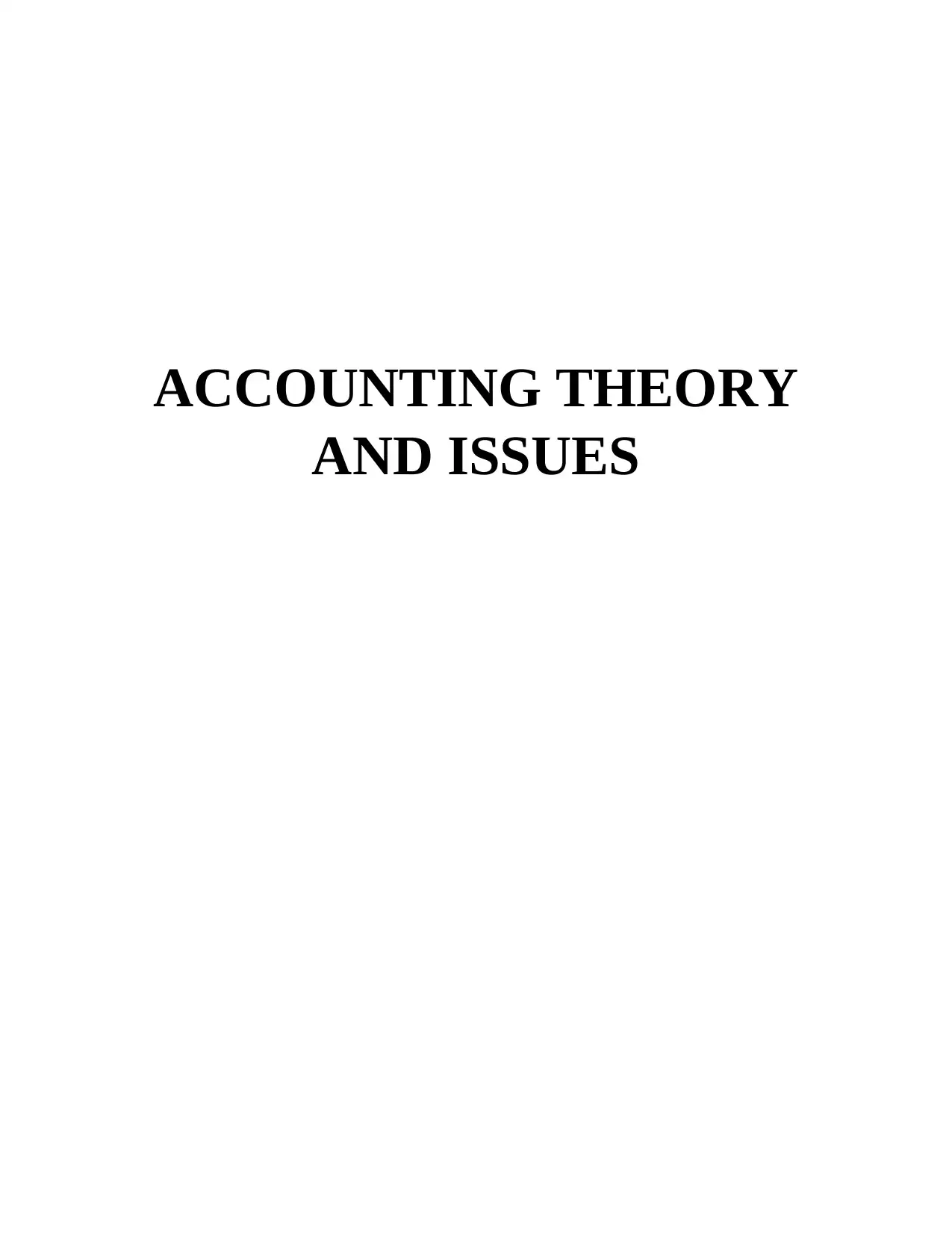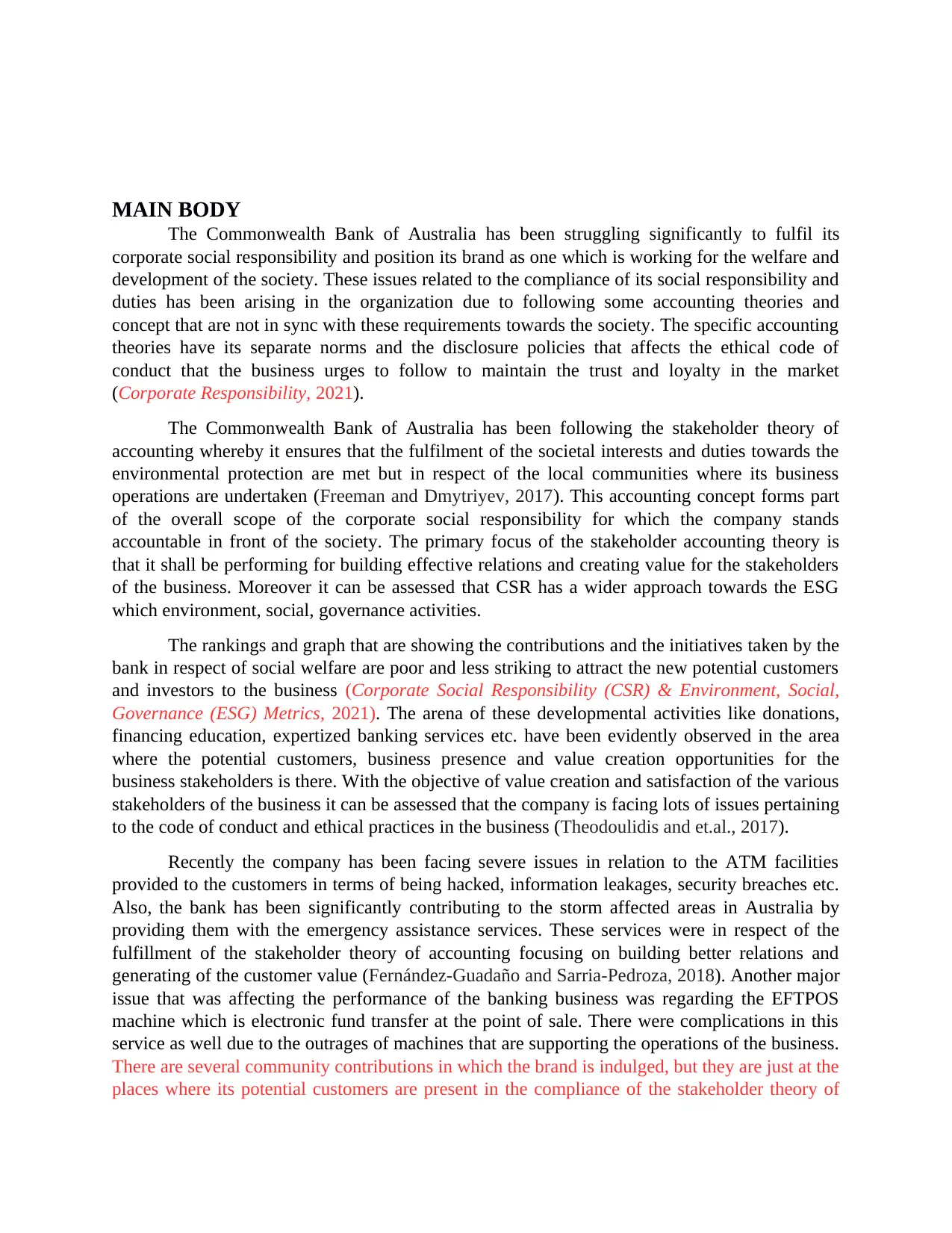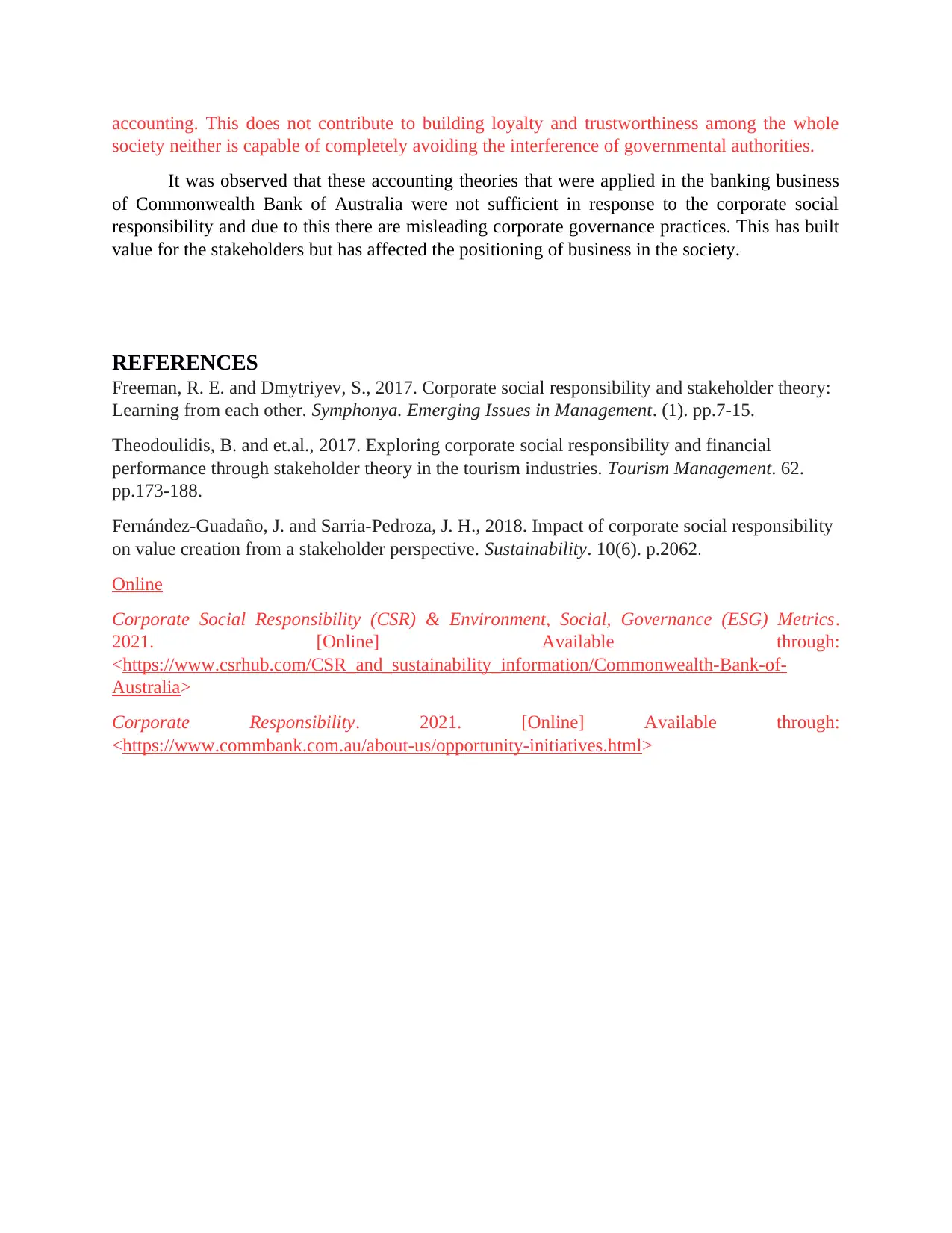Accounting Theory and CSR: Commonwealth Bank of Australia Report
VerifiedAdded on 2022/12/07
|4
|824
|273
Report
AI Summary
This report examines the Commonwealth Bank of Australia's struggles in fulfilling its corporate social responsibility (CSR) obligations. The analysis focuses on how accounting theories, particularly stakeholder theory, influence the bank's ethical conduct and corporate governance. The report highlights issues such as ATM security breaches, EFTPOS machine complications, and the bank's contributions to community initiatives, assessing how these relate to stakeholder value creation and societal trust. The study argues that the bank's application of accounting theories has led to misleading corporate governance practices and affected its societal positioning, despite value creation for stakeholders. The report references various sources to support its claims, emphasizing the need for alignment between accounting theories and CSR goals to maintain market trust and loyalty.

ACCOUNTING THEORY
AND ISSUES
AND ISSUES
Paraphrase This Document
Need a fresh take? Get an instant paraphrase of this document with our AI Paraphraser

TABLE OF CONTENTS
MAIN BODY..................................................................................................................................................3
REFERENCES................................................................................................................................................4
Corporate Responsibility. 2021. [Online] Available through: <https://www.commbank.com.au/about-
us/opportunity-initiatives.html>.................................................................................................................4
MAIN BODY..................................................................................................................................................3
REFERENCES................................................................................................................................................4
Corporate Responsibility. 2021. [Online] Available through: <https://www.commbank.com.au/about-
us/opportunity-initiatives.html>.................................................................................................................4

MAIN BODY
The Commonwealth Bank of Australia has been struggling significantly to fulfil its
corporate social responsibility and position its brand as one which is working for the welfare and
development of the society. These issues related to the compliance of its social responsibility and
duties has been arising in the organization due to following some accounting theories and
concept that are not in sync with these requirements towards the society. The specific accounting
theories have its separate norms and the disclosure policies that affects the ethical code of
conduct that the business urges to follow to maintain the trust and loyalty in the market
(Corporate Responsibility, 2021).
The Commonwealth Bank of Australia has been following the stakeholder theory of
accounting whereby it ensures that the fulfilment of the societal interests and duties towards the
environmental protection are met but in respect of the local communities where its business
operations are undertaken (Freeman and Dmytriyev, 2017). This accounting concept forms part
of the overall scope of the corporate social responsibility for which the company stands
accountable in front of the society. The primary focus of the stakeholder accounting theory is
that it shall be performing for building effective relations and creating value for the stakeholders
of the business. Moreover it can be assessed that CSR has a wider approach towards the ESG
which environment, social, governance activities.
The rankings and graph that are showing the contributions and the initiatives taken by the
bank in respect of social welfare are poor and less striking to attract the new potential customers
and investors to the business (Corporate Social Responsibility (CSR) & Environment, Social,
Governance (ESG) Metrics, 2021). The arena of these developmental activities like donations,
financing education, expertized banking services etc. have been evidently observed in the area
where the potential customers, business presence and value creation opportunities for the
business stakeholders is there. With the objective of value creation and satisfaction of the various
stakeholders of the business it can be assessed that the company is facing lots of issues pertaining
to the code of conduct and ethical practices in the business (Theodoulidis and et.al., 2017).
Recently the company has been facing severe issues in relation to the ATM facilities
provided to the customers in terms of being hacked, information leakages, security breaches etc.
Also, the bank has been significantly contributing to the storm affected areas in Australia by
providing them with the emergency assistance services. These services were in respect of the
fulfillment of the stakeholder theory of accounting focusing on building better relations and
generating of the customer value (Fernández-Guadaño and Sarria-Pedroza, 2018). Another major
issue that was affecting the performance of the banking business was regarding the EFTPOS
machine which is electronic fund transfer at the point of sale. There were complications in this
service as well due to the outrages of machines that are supporting the operations of the business.
There are several community contributions in which the brand is indulged, but they are just at the
places where its potential customers are present in the compliance of the stakeholder theory of
The Commonwealth Bank of Australia has been struggling significantly to fulfil its
corporate social responsibility and position its brand as one which is working for the welfare and
development of the society. These issues related to the compliance of its social responsibility and
duties has been arising in the organization due to following some accounting theories and
concept that are not in sync with these requirements towards the society. The specific accounting
theories have its separate norms and the disclosure policies that affects the ethical code of
conduct that the business urges to follow to maintain the trust and loyalty in the market
(Corporate Responsibility, 2021).
The Commonwealth Bank of Australia has been following the stakeholder theory of
accounting whereby it ensures that the fulfilment of the societal interests and duties towards the
environmental protection are met but in respect of the local communities where its business
operations are undertaken (Freeman and Dmytriyev, 2017). This accounting concept forms part
of the overall scope of the corporate social responsibility for which the company stands
accountable in front of the society. The primary focus of the stakeholder accounting theory is
that it shall be performing for building effective relations and creating value for the stakeholders
of the business. Moreover it can be assessed that CSR has a wider approach towards the ESG
which environment, social, governance activities.
The rankings and graph that are showing the contributions and the initiatives taken by the
bank in respect of social welfare are poor and less striking to attract the new potential customers
and investors to the business (Corporate Social Responsibility (CSR) & Environment, Social,
Governance (ESG) Metrics, 2021). The arena of these developmental activities like donations,
financing education, expertized banking services etc. have been evidently observed in the area
where the potential customers, business presence and value creation opportunities for the
business stakeholders is there. With the objective of value creation and satisfaction of the various
stakeholders of the business it can be assessed that the company is facing lots of issues pertaining
to the code of conduct and ethical practices in the business (Theodoulidis and et.al., 2017).
Recently the company has been facing severe issues in relation to the ATM facilities
provided to the customers in terms of being hacked, information leakages, security breaches etc.
Also, the bank has been significantly contributing to the storm affected areas in Australia by
providing them with the emergency assistance services. These services were in respect of the
fulfillment of the stakeholder theory of accounting focusing on building better relations and
generating of the customer value (Fernández-Guadaño and Sarria-Pedroza, 2018). Another major
issue that was affecting the performance of the banking business was regarding the EFTPOS
machine which is electronic fund transfer at the point of sale. There were complications in this
service as well due to the outrages of machines that are supporting the operations of the business.
There are several community contributions in which the brand is indulged, but they are just at the
places where its potential customers are present in the compliance of the stakeholder theory of
⊘ This is a preview!⊘
Do you want full access?
Subscribe today to unlock all pages.

Trusted by 1+ million students worldwide

accounting. This does not contribute to building loyalty and trustworthiness among the whole
society neither is capable of completely avoiding the interference of governmental authorities.
It was observed that these accounting theories that were applied in the banking business
of Commonwealth Bank of Australia were not sufficient in response to the corporate social
responsibility and due to this there are misleading corporate governance practices. This has built
value for the stakeholders but has affected the positioning of business in the society.
REFERENCES
Freeman, R. E. and Dmytriyev, S., 2017. Corporate social responsibility and stakeholder theory:
Learning from each other. Symphonya. Emerging Issues in Management. (1). pp.7-15.
Theodoulidis, B. and et.al., 2017. Exploring corporate social responsibility and financial
performance through stakeholder theory in the tourism industries. Tourism Management. 62.
pp.173-188.
Fernández-Guadaño, J. and Sarria-Pedroza, J. H., 2018. Impact of corporate social responsibility
on value creation from a stakeholder perspective. Sustainability. 10(6). p.2062.
Online
Corporate Social Responsibility (CSR) & Environment, Social, Governance (ESG) Metrics.
2021. [Online] Available through:
<https://www.csrhub.com/CSR_and_sustainability_information/Commonwealth-Bank-of-
Australia>
Corporate Responsibility. 2021. [Online] Available through:
<https://www.commbank.com.au/about-us/opportunity-initiatives.html>
society neither is capable of completely avoiding the interference of governmental authorities.
It was observed that these accounting theories that were applied in the banking business
of Commonwealth Bank of Australia were not sufficient in response to the corporate social
responsibility and due to this there are misleading corporate governance practices. This has built
value for the stakeholders but has affected the positioning of business in the society.
REFERENCES
Freeman, R. E. and Dmytriyev, S., 2017. Corporate social responsibility and stakeholder theory:
Learning from each other. Symphonya. Emerging Issues in Management. (1). pp.7-15.
Theodoulidis, B. and et.al., 2017. Exploring corporate social responsibility and financial
performance through stakeholder theory in the tourism industries. Tourism Management. 62.
pp.173-188.
Fernández-Guadaño, J. and Sarria-Pedroza, J. H., 2018. Impact of corporate social responsibility
on value creation from a stakeholder perspective. Sustainability. 10(6). p.2062.
Online
Corporate Social Responsibility (CSR) & Environment, Social, Governance (ESG) Metrics.
2021. [Online] Available through:
<https://www.csrhub.com/CSR_and_sustainability_information/Commonwealth-Bank-of-
Australia>
Corporate Responsibility. 2021. [Online] Available through:
<https://www.commbank.com.au/about-us/opportunity-initiatives.html>
1 out of 4
Related Documents
Your All-in-One AI-Powered Toolkit for Academic Success.
+13062052269
info@desklib.com
Available 24*7 on WhatsApp / Email
![[object Object]](/_next/static/media/star-bottom.7253800d.svg)
Unlock your academic potential
Copyright © 2020–2026 A2Z Services. All Rights Reserved. Developed and managed by ZUCOL.




